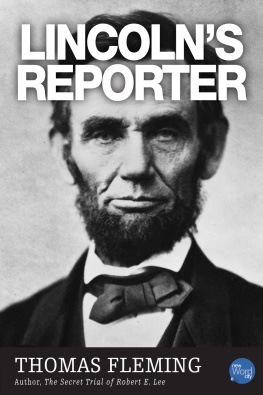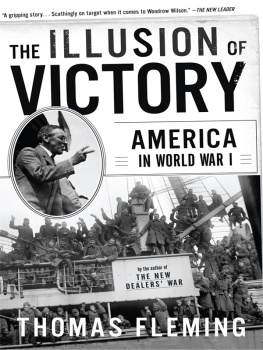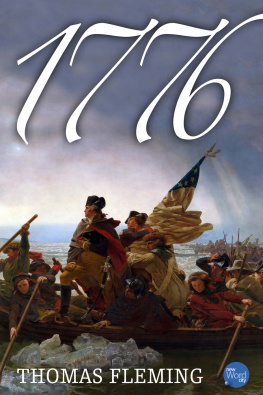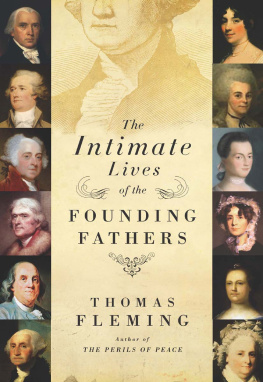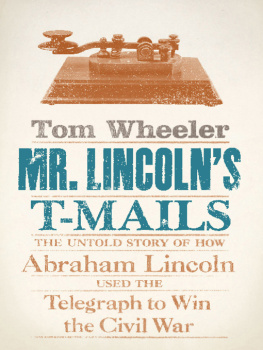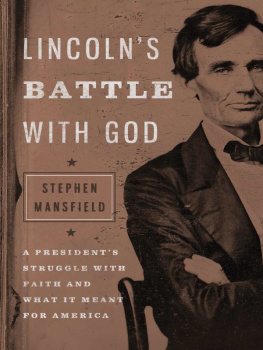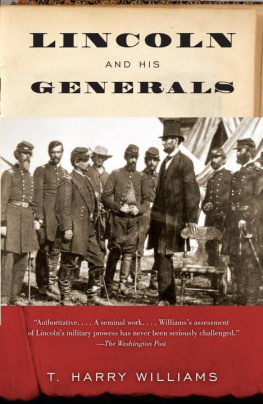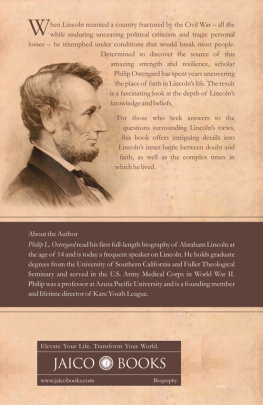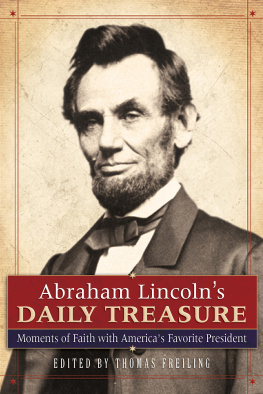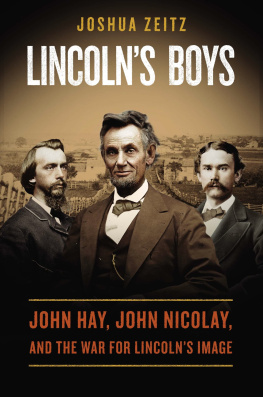Thomas Fleming - Lincolns Reporter
Here you can read online Thomas Fleming - Lincolns Reporter full text of the book (entire story) in english for free. Download pdf and epub, get meaning, cover and reviews about this ebook. year: 2013, publisher: New Word City, genre: History. Description of the work, (preface) as well as reviews are available. Best literature library LitArk.com created for fans of good reading and offers a wide selection of genres:
Romance novel
Science fiction
Adventure
Detective
Science
History
Home and family
Prose
Art
Politics
Computer
Non-fiction
Religion
Business
Children
Humor
Choose a favorite category and find really read worthwhile books. Enjoy immersion in the world of imagination, feel the emotions of the characters or learn something new for yourself, make an fascinating discovery.
- Book:Lincolns Reporter
- Author:
- Publisher:New Word City
- Genre:
- Year:2013
- Rating:4 / 5
- Favourites:Add to favourites
- Your mark:
- 80
- 1
- 2
- 3
- 4
- 5
Lincolns Reporter: summary, description and annotation
We offer to read an annotation, description, summary or preface (depends on what the author of the book "Lincolns Reporter" wrote himself). If you haven't found the necessary information about the book — write in the comments, we will try to find it.
During the Civil War Abraham Lincoln often learned the results and tolls of battles from reporters not generals newsmen of the time were courageous and dedicated but the best of them was Henry Wing - at least that was Lincolns opinion Wing never used his position as the presidents favorite reporter to gain access to confidential information Instead he became Lincolns junior partner in the struggle to win Americas bloodiest war Here in this short-form book is his surprising story
Lincolns Reporter — read online for free the complete book (whole text) full work
Below is the text of the book, divided by pages. System saving the place of the last page read, allows you to conveniently read the book "Lincolns Reporter" online for free, without having to search again every time where you left off. Put a bookmark, and you can go to the page where you finished reading at any time.
Font size:
Interval:
Bookmark:
During the Civil War, some of the most accurate information from the front lines was the result of responsible reporting. The news reporters of the time were courageous and dedicated, but the best of the breed was young Henry Wing - at least, thats what Abraham Lincoln thought.
At the age of twenty-four, Henry Wing of Goshen, Connecticut, became the favorite reporter of the president of the United States. Wing never used this unique position to pry secret information from Lincoln. Instead, he became Lincolns junior partner, almost a spiritual son, in the struggle to win Americas bloodiest war.
Wing won his elevation by a rare combination of courage and coincidence. On May 3, 1864, General Ulysses S. Grant and an army of 150,000 men began a march toward the Confederate capital of Richmond. It was a crucial move. If the Army of the Potomac could break through General Robert E. Lees defenses, they would end the Civil War. If they failed, it would almost inevitably mean that the people of the North, already showing alarming signs of war weariness, would give up the struggle and let the South secede.
For three days, no one in Washington had heard a word from Grant. His army seemed to have vanished from the face of the earth. By May 6, the capital city was swarming with rumors and incipient panic. Grants silence seemed to intimate that disaster had befallen his army. No one was more anxious than Abraham Lincoln in the White House. The president had staked his political future on his faith in Grants ability to fight his way to Richmond. Young Henry Wing, hitherto unknown as a war correspondent, brought the worried president an unexpected answer to his prayers.
Before Wing began his newspaper career, he had served as a member of the color guard in the 27th Regiment of Connecticut Volunteers. He had been badly wounded in the leg and arm and lost two fingers at the Battle of Fredericksburg. Returning home to Connecticut as an invalid with a bad limp, Wing devoted himself to writing editorials against the spirit of defeatism that was engulfing the North as the war dragged on. His columns in the Goshen paper attracted the attention of Horace Greeley, the editor of the New York Tribune. Greeley hired Wing and assigned him to the papers Washington, D.C., office.
There, Wing discovered a war within a war. The antagonists were the reporters and Lincolns brusque secretary of war, Edwin M. Stanton. The secretary was convinced that the reporters cared more about a good story than about the future of their country. He fulminated against their tendency to reveal secret movements of the army and to slant their stories to favor certain generals who leaked them information. Stanton repeatedly forbade correspondents to accompany the army into battle. They ignored him until a month or so before Grant marched on Richmond. This move was so important and so secret that Stanton issued a sweeping directive, banning all civilians from the armys camp. The correspondents were herded back to Washington.
Sam Wilkeson, head of the Tribunes Washington bureau, grew frantic when his news sources dried up. He asked for a volunteer who was willing to risk time in an army prison to venture into Grants camp. Henry Wing, eager to get started as a war correspondent, accepted the challenge. His knowledge of army routine helped him elude Stantons military police guarding the roads. Once Wing reached Grants headquarters, he was safe. Grant liked reporters and was not very fond of Stanton. Soon, several other reporters repeated Wings foray, and Wilkeson had plenty of news to send the Tribune in New York.
When Lincoln ordered Grant to advance on Richmond and the army began its momentous three-day march, Wing and his fellow reporters went with them. Thus, they were present for one of the most stupendous battles of the war - the Wilderness. From his entrenchments in this dense tangle of timber and brush, Lee launched a savage attack. Hordes of Confederate cavalry raced around the Union flanks to snip telegraph wires and cut all the roads to Washington.
For two days, the fighting raged with unabated fury. As dusk fell on the second day, the reporters gathered at Grants headquarters and decided that one of them ought to take a dispatch back to the capital. Henry Wing, the pioneer rebel against Secretary of War Stanton, was chosen. As he was about to depart, Grant called him into his tent and gave him a personal message for the president.
At 4:00 a.m. on May 6, Wing began his seventy-mile journey. He wore the official uniform of a Tribune correspondent - corduroy knickers, a buckskin jacket, and expensive leather boots. As dawn broke, he stopped at the town of Culpepper, Virginia, to get directions from a Union sympathizer. The man took one look at Wing and urged him to change his clothes. Some of the Reb cavalry would love to string a Tribune correspondent from the nearest tree, he said.
Wing hastily borrowed dirty overalls, mud-caked shoes, and a ragged cap from his wise friend and turned his Yankee twang into a Southern drawl. Within a few miles, he met a gray-clad cavalry detachment and told them that he was on his way to Washington to tell Confederate sympathizers there that Lee was beating the abolitionist daylights out of Grant. The rebels liked this idea so much that they gave Wing an escort to protect him against Yankee stragglers.
All went well until they reached Kellys Ford, on the Rappahannock River. Kelly was heart and soul for the Southern cause, and he had seen Wing several times during his sojourn with the army: Correspondents were glamorous figures who always attracted extra attention. Kelly peered suspiciously at Wing as they waited for the ferry. Thats a Yankee! he shouted and lunged for Wings bridle.
Wings horse, a spirited gelding named Jess, bounded into the river. The rebel escorts blazed away at both horse and rider, but they were miserable shots. The swift current swept Wing out of range in a few minutes. About a mile downstream, he gained the opposite bank, unscathed. Over the next few hours, Wing drawled his way through several more Confederate road blocks. They were eager to believe his story of Lees victory. But the closer Wing got to Washington, the more numerous the rebels became, and he noticed that many of them stared suspiciously at Jess, wondering how a field hand owned such an expensive horse.
Wing decided to tie Jess in a secluded thicket, give him a bag of oats, and finish his trip by hoofing it along the railroad line to Washington. He talked his way through a Confederate cavalry camp near Manassas Junction and, as darkness fell, finally reached the telegraph station of Union Mills in territory controlled by Federal troops. Here, Wing was amazed to find himself deluged with questions about the battle. He realized that he was the first man to emerge from the Wilderness with any hard news. He rushed to the telegraph office and begged the operator to send a dispatch. He got a stony no. The army was letting only military orders over the line. Wing offered $1,000 for a railroad handcart. Again, the answer was no. The railroad was also army property.
Desperate, Wing talked the operator into telegraphing Charles Dana, first assistant secretary of war. He had been a Tribune editor. Back came an outraged squawk from Secretary Stanton. Dana was not in his office, and the wire had gone to his boss. Stanton demanded news about Grants army. The young Tribune correspondent coolly promised to tell him everything he knew - if the secretary would let him send a dispatch to his newspaper first.
The telegraph furiously clicked Stantons reply. SEND YOUR NEWS FROM GRANT IMMEDIATELY. OTHERWISE WE WILL HAVE YOU SHOT AS A SPY.
THE TRIBUNE COMES FIRST, Wing stubbornly replied.
The telegraph fell silent. Wing was in despair. He had had little sleep for the two previous nights and had walked twenty-four miles on his wounded leg. The telegraph chattered again. A wide-eyed clerk handed Wing the message.
Font size:
Interval:
Bookmark:
Similar books «Lincolns Reporter»
Look at similar books to Lincolns Reporter. We have selected literature similar in name and meaning in the hope of providing readers with more options to find new, interesting, not yet read works.
Discussion, reviews of the book Lincolns Reporter and just readers' own opinions. Leave your comments, write what you think about the work, its meaning or the main characters. Specify what exactly you liked and what you didn't like, and why you think so.

